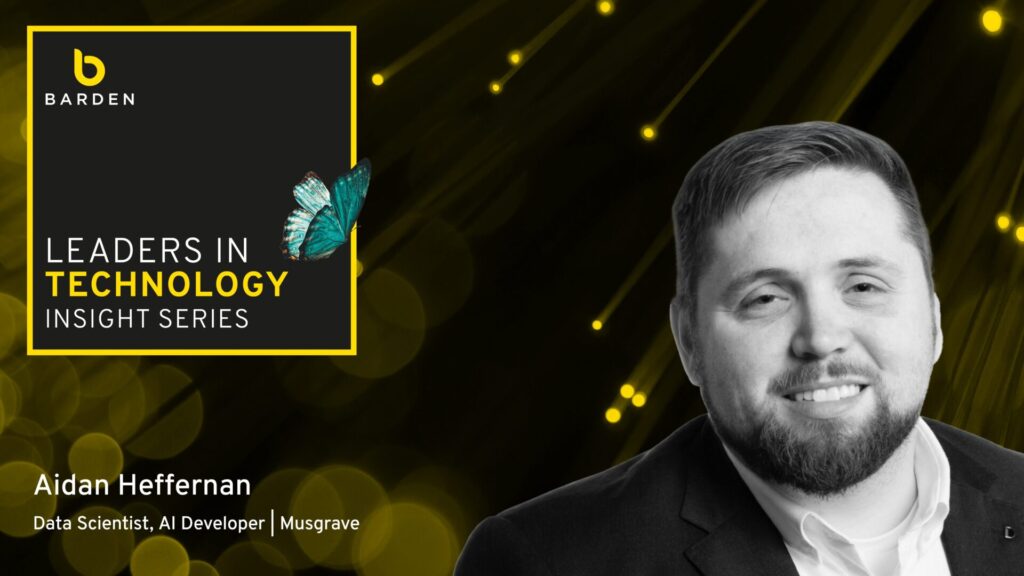Can you tell us about your background and career to date?
I graduated in 2015 with a degree in Maths and initially went into finance, working for hedge fund administrators and the insurance industry. This is where I first engaged with data, building reporting solutions for internal and external parties. After about five years in these roles, I decided to further my education. I completed a master’s in data analytics at UCC to learn more about machine learning, and how to build models and interpret them.
Following my master’s, I worked as a data scientist for an insurance company, which was an exciting time as Gen AI started gaining traction. I’ve been with Musgrave for a year as a data scientist on the Analytics team in their Insights and Innovation Department. This path from maths to data science is common, as many find better opportunities there compared to academia.
Gen AI, which wasn’t a major topic during my master’s, is now at the forefront. Personally and professionally, I see this technology as pivotal in the coming years, with significant impacts on organisations.
What technologies do you think will have the most impact on organisations in the next few years?
I think Generative AI is one of the most significant advancements today. For instance, Microsoft Teams features a tool called Copilot 365, which integrates these new AI models into various functions within the 365 environment. This integration will greatly impact productivity by automating mundane tasks, allowing people to focus on more engaging work. I recently gave a presentation on using Generative AI in the workplace, and although only two out of 30 attendees used it daily, by the end, everyone wanted to adopt it.
From a data perspective, I am a big fan of Databricks. It enables you to store tables and quickly spin up compute resources without heavy IT involvement. It is language-agnostic, supporting SQL, Python, Scala, and R within a single interface. Databricks includes tools for data engineering, analytics, data science, and machine learning, making workflows much faster and more manageable. It has had a massive impact on my career, and I use it daily.
Another tool gaining attention is Microsoft Fabric. Unlike the code-heavy Databricks, Microsoft Fabric is less code-intensive, making it suitable for many businesses. While Databricks drives Azure consumption and is favoured for big data challenges, Microsoft Fabric offers a more standardised solution for various business needs. Although Microsoft recently began promoting Microsoft Fabric more heavily, they previously emphasised Databricks for data analytics functions.
Given your evident passion for these tools and their potential with data, could you explain the tangible impacts that AI and analytics tools have on businesses for someone less familiar with them?
Starting with Generative AI, its main value for businesses is increased productivity. It’s like having a sidekick that boosts your productivity by about 20%. Businesses using these tools will have a significant productivity advantage over those that don’t. There’s a misconception that AI will replace jobs; in reality, it’s about people using AI to enhance their work. Generative AI can make tasks easier and more efficient.
For tools like Databricks and Microsoft Fabric, the impact varies by company. Data-centric companies like PayPal or Google, whose revenue depends on data, see obvious benefits. They can leverage data to understand customer behaviour, target ads, or predict trends. Non-data-centric companies, such as those in traditional industries, can use these tools to monetise data or make better decisions. For instance, they can analyse which products perform well in certain areas and adjust their strategies accordingly. The value lies in creatively leveraging data to drive revenue and improve operations.

You have a lot of experience with machine learning and Gen AI tools – do you think organisations will adopt internal models like ChatGPT or Gemini, where employees can teach and improve them? How soon might this happen?
Some companies already have this capability, and it can be implemented relatively quickly with the right dedication of time and resources. Data-first companies are likely already using internal models that understand their data, allowing employees to ask questions such as, “How have sales been in the last six months?” or “What’s the policy on annual leave?” These chatbots can handle many internal customer service tasks.
Non-data-centric companies will be slower to adopt, but the key is giving large language models the right context. For instance, Microsoft 365’s Copilot uses SharePoint to create a semantic model, helping users find specific information like presentations on new hires’ performance. Context is crucial—without it, the model’s answers can be broad and inaccurate.
For businesses adopting Generative AI, it’s essential to structure their data so these models can access it effectively. This approach democratises data access, allowing employees to interact with their data through conversation rather than needing to know specific code or search methods. It’s more than just a question-and-answer session; it’s an interactive dialogue with your data, a back-and-forth exchange with continuous feedback.
What key skills should people focus on if they want a career in data science and analytics?
The key thing is to be open-minded and adaptable. Don’t get locked into a specific way of using technology because it’s evolving rapidly. The next two years could bring significant changes, so staying flexible and open to new methods is crucial.
In terms of hard skills, research and understanding how to use the technology are vital. Particularly with Gen AI and some forms of machine learning, you need to know that these tools are not prescriptive. They try to guess what you want, so they can be wrong. You must be willing to work with the technology, even when it gives you incorrect answers. Learning to ask the right questions and understanding the tool’s knowledge limits are essential.
Understanding how the underlying system or data works is also important. You don’t need to know every detail, like the type of neural network or the number of nodes. But you should have a general understanding of how things can go wrong and what to expect. Ultimately, it’s not technology that will replace our jobs; it’s the people who master these technologies who will.


 Jump Back
Jump Back

